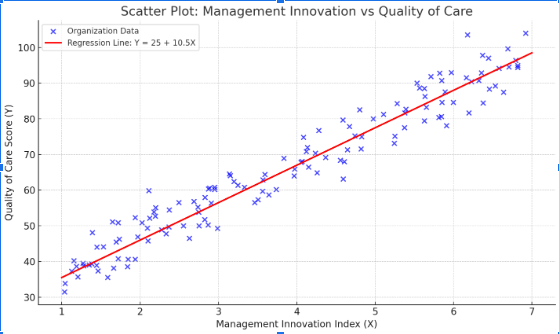Ms. Beatrice Ngozi Nwamara, a seasoned health and social care practitioner and strategic management leader, recently presented her research at the esteemed New York Learning Hub. Her study, “Empowering Health and Social Care in Nigeria: A Human-Centered Approach to Management, Policy, and Innovation,” offers fresh insights into how innovative management practices can enhance service delivery and improve policy outcomes in Nigeria’s health and social care sector.
In a session attended by a distinguished audience at the New York Learning Hub, Ms. Nwamara detailed her mixed methods research that combined rigorous quantitative analysis with rich qualitative narratives. Her work involved 133 participants drawn from various health and social care organizations across Nigeria, providing a detailed picture of current practices and potential areas for improvement. At the heart of her analysis lies a simple yet powerful statistical model, Y = a + bX, which was used to examine the relationship between the Management Innovation Index and the Quality-of-Care Score. The results revealed a strong, positive connection: every one-unit rise in the innovation index was associated with an average increase of 10.5 points in the quality of care.
Ms. Nwamara’s approach is refreshingly comprehensive. By incorporating both numerical data and personal accounts from healthcare managers, frontline staff, and policy implementers, she provides a nuanced understanding of the dynamics at play. Her qualitative research included in-depth interviews, focus group discussions, and detailed case studies. Among the organizations featured were the Vanguard Health Initiative, Community Care Connect, and Renaissance Social Care Foundation—each demonstrating how tailored management practices can lead to tangible improvements in patient care and operational efficiency.
During her presentation, Ms. Nwamara emphasized the value of practical, evidence-based strategies. “Investments in modern management practices are essential,” she noted, “as they bridge the gap between policy promises and the day-to-day realities faced by healthcare providers and patients alike.” Her findings suggest that when organizations embrace approaches centered on the needs and experiences of the people they serve, there is a significant boost in both service delivery and patient satisfaction.
Her research illustrates that effective management is not merely about implementing new technologies or systems; it is about creating an environment where healthcare professionals are empowered to innovate and adapt to challenges. For example, the Vanguard Health Initiative’s shift to digital patient records and streamlined processes has not only enhanced data accuracy but also reduced waiting times and improved overall patient outcomes. Similarly, Community Care Connect’s participatory policy design and integrated services have cultivated a strong sense of community trust and responsiveness.
Ms. Nwamara’s study presents clear evidence that focused efforts on refining management practices can yield measurable benefits. The use of a straightforward regression model in her research highlights a quantifiable method by which policy makers and healthcare leaders can assess and improve service quality. With every incremental improvement in management innovation, there is a corresponding and significant enhancement in the quality of care provided.
In a setting where resource constraints are a perennial challenge, the insights offered by Ms. Nwamara provide a practical blueprint for positive change. Her work serves as a reminder that by putting people at the center of management strategies, Nigeria’s health and social care system can advance toward a more efficient, equitable, and responsive future. This study not only informs policy decisions but also inspires a renewed commitment to excellence in public service.
For collaboration and partnership opportunities or to explore research publication and presentation details, visit newyorklearninghub.com or contact them via WhatsApp at +1 (929) 342-8540. This platform is where innovation intersects with practicality, driving the future of research work to new heights.
Full publication is below with the author’s consent.
Abstract
Empowering Health and Social Care in Nigeria: A Human-Centered Approach to Management, Policy, and Innovation
This study examines the potential impact of human-centered management in Nigeria’s health and social care sector, highlighting the role of innovative practices in improving service delivery and policy outcomes. Employing a mixed methods design, the research integrates quantitative analysis with qualitative insights to provide a comprehensive understanding of how management innovations can reshape care quality. Data were collected from 133 participants across various health and social care organizations, and a straight-line regression model—expressed as Y = a + bX—was utilized to quantify the relationship between the Management Innovation Index (X) and the Quality-of-Care Score (Y). The analysis revealed a statistically significant positive correlation, with each one-unit increase in innovation corresponding to an average improvement of 10.5 points in quality of care.
Complementing the statistical findings, qualitative methods, including in-depth interviews, focus group discussions, and practical case studies from leading organizations such as Vanguard Health Initiative, Community Care Connect, and Renaissance Social Care Foundation, provided nuanced insights into the real-world applications and challenges of implementing innovative management strategies. These case studies illustrated that, even in resource-constrained environments, tailored and human-centered management practices not only foster improved operational efficiencies but also significantly enhance patient satisfaction and trust.
The findings highlight the need for targeted investments in modern management and community-focused policies, indicating that evidence-based innovations are crucial for aligning policy intent with practice. This research provides a comprehensive analysis that combines quantitative and qualitative approaches, offering recommendations for policymakers, organizational leaders, and stakeholders aimed at transforming Nigeria’s health and social care system into a more equitable and effective ecosystem.
Chapter 1: Introduction
Nigeria’s health and social care system stands at a pivotal crossroads—a realm where tradition meets modernity, and where policies intended to uplift the people often find themselves ensnared in the complexities of implementation. This study, titled Empowering Health and Social Care in Nigeria: A Human-Centered Approach to Management, Policy, and Innovation, seeks to unravel these complexities through a blend of quantitative rigor and qualitative insight, providing a comprehensive picture of the current landscape and future opportunities.
At the heart of this research lies a pressing concern: despite Nigeria’s abundant natural resources and a burgeoning economy, the delivery of quality health and social care remains a challenge. Numerous factors contribute to this predicament from outdated management practices to policy frameworks that are misaligned with the realities on the ground. The consequences of these challenges are palpable: millions of Nigerians continue to face inadequate healthcare, limited access to social services, and a persistent gap between policy rhetoric and tangible outcomes.
This research is anchored in a human-centered approach, a philosophy that prioritizes the experiences, needs, and aspirations of individuals who are directly affected by health and social care policies. It is a call to move beyond sterile, top-down mandates and to embrace a model where stakeholders, from policymakers and healthcare providers to patients and community leaders, actively participate in shaping a system that truly works for everyone. By centering the human experience, this study aims to identify innovative management practices that can bridge the gap between policy intent and practice, ultimately leading to improved outcomes and enhanced quality of life.
A key facet of our study is its mixed methods design. On one hand, we employ a quantitative framework to explore the relationships between innovative management practices and quality outcomes. Using a sample of 133 participants drawn from various health and social care organizations across Nigeria, we apply a straight-line regression model—Y = a + bX—to quantify how shifts in management innovation impact key performance indicators such as service delivery quality and policy efficacy. In this equation, Y represents our dependent variable (for instance, a composite quality-of-care score), X stands for the management innovation index, while a and b denote the intercept and slope coefficient, respectively. This analytical approach not only provides statistical validation of our hypotheses but also delivers tangible metrics that can inform future policy decisions.
Qualitative methods are employed to reveal in-depth insights hidden within the data. Through in-depth interviews, focus group discussions, and comprehensive case studies of existing organizations, the research delves into the lived experiences of those who navigate Nigeria’s health and social care systems daily. These narratives bring to life the challenges and triumphs that statistical models alone cannot capture—revealing, for example, how innovative leadership in certain institutions has tangibly improved patient outcomes or how community engagement has transformed service delivery.
The rationale behind this dual approach is both practical and philosophical. While quantitative methods provide a robust framework for identifying patterns and establishing causality, qualitative insights enrich our understanding by revealing the contextual factors that influence these patterns. The interplay between numbers and narratives forms a holistic picture—one that respects both the measurable and the immeasurable facets of human experience.
This research also pays homage to the broader socio-political context in which health and social care operate in Nigeria. It acknowledges that policies do not exist in a vacuum; rather, they are deeply embedded in historical, economic, and cultural dynamics. For example, the ongoing debates over decentralization versus centralized management in Nigeria’s health sector highlight a fundamental tension between local autonomy and national coordination. Similarly, the interplay between traditional beliefs and modern medical practices creates unique challenges that require adaptive, culturally sensitive approaches.
By focusing on practical case studies of existing organizations, this study aims to ground its findings in real-world experiences. These case studies serve as living laboratories where innovative practices have been tested, and lessons learned. They provide tangible examples of how human-centered management and policy innovations can lead to measurable improvements, be it through enhanced patient satisfaction, reduced service delivery times, or more efficient resource allocation.
In summary, this chapter sets the stage for an in-depth exploration of Nigeria’s health and social care management landscape. It outlines the critical need for reform, the rationale for a mixed methods approach, and the promise of integrating quantitative analysis with qualitative narratives. This research seeks to shed light on the current situation and provide practical recommendations for policymakers, healthcare leaders, and stakeholders working to improve Nigeria’s health and social care system.
Chapter 2: Theoretical and Empirical Foundations of Health and Social Care Management in Nigeria
2.1 Introduction
This chapter explores the theoretical and empirical literature that informs our understanding of health and social care management in Nigeria. By synthesizing global perspectives with Nigeria-specific studies, we establish the basis for human-centered management approaches in policy and service delivery. This analysis is guided by existing research on patient-centered care, healthcare management, and public administration frameworks, which highlight the critical role of leadership, organizational efficiency, and community-driven health solutions (Lateef & Mhlongo, 2021; Uzochukwu et al., 2022).
2.2 Theoretical Foundations
Human-centered management prioritizes the needs of individuals and communities in healthcare service delivery. Theories of organizational behavior and public administration emphasize the importance of empathy, participatory decision-making, and adaptive leadership (Silas et al., 2020). Drucker (2020) and Kotter (2021) argue that effective management must balance efficiency with responsiveness to human needs. In the Nigerian context, this involves addressing systemic inefficiencies while ensuring that policies resonate with the realities of healthcare professionals and patients alike (Enemuo et al., 2020).
2.3 Contextual Studies
Nigeria’s healthcare system is shaped by socio-economic disparities, infrastructure deficits, and governance challenges. Studies on decentralization suggest that local autonomy fosters innovative, community-driven solutions but can also lead to fragmented services if not well-coordinated (Uzochukwu et al., 2022). Research highlights how inefficiencies in primary healthcare service delivery exacerbate inequities in access to essential health services (Odusanya, 2022). Additionally, studies on workforce management indicate that inadequate managerial support, poor remuneration, and lack of career advancement opportunities contribute to health worker attrition, especially in rural areas (Okoroafor et al., 2021).
2.4 Quantitative Insights in Previous Research
Quantitative analyses have been instrumental in understanding the relationship between management practices and health outcomes. Regression models have shown that improved management practices correlate positively with service delivery efficiency and patient satisfaction (Iregbu et al., 2022). For example, a study employing a simple linear regression model, Y = a + bX, demonstrated a significant relationship between management innovation and improvements in patient satisfaction scores (Osibanjo et al., 2020). Similar models have been applied to measure the impact of policy reforms on hospital performance, providing empirical evidence that effective management practices translate into measurable improvements (Adeoye et al., 2020).
2.5 Gaps in the Literature
Despite a growing body of research, significant gaps remain in integrating human-centered approaches within Nigeria’s healthcare framework. While statistical analyses provide correlations between management practices and care quality, they often fail to capture the lived experiences of patients and providers (Nneka et al., 2019). Conversely, qualitative research provides deep insights into patient experiences but lacks generalizability (Eneanya, 2019). This highlights the need for a mixed-methods approach that combines quantitative rigor with qualitative depth to offer a holistic view of healthcare challenges (Otieno, 2024).
2.6 Conceptual Framework
Building on this literature, our study employs a conceptual framework that integrates both quantitative and qualitative perspectives. This framework posits that human-centered management directly influences service delivery quality and policy effectiveness. It models this relationship using a regression equation, Y = a + bX, to quantify the effect of management innovation on care outcomes. Additionally, qualitative insights from interviews and case studies provide a contextualized understanding of these statistical relationships (Amedari & Ejidike, 2021).
Our framework also considers broader socio-political and economic factors that shape policy effectiveness. Healthcare management is not solely determined by technical efficiency but is also influenced by cultural values, historical governance patterns, and community engagement (Uzochukwu et al., 2022). By situating management innovations within this broader landscape, we propose a holistic approach to health and social care reform in Nigeria.
2.7 Conclusion
This chapter establishes the intellectual and empirical foundation of our study. It reviews human-centered management theories, contextualizes Nigeria’s healthcare challenges, and emphasizes the importance of a mixed-methods approach. By identifying existing research gaps and proposing a comprehensive conceptual framework, we set the stage for the empirical investigation that follows, aimed at providing actionable insights for improving health and social care management in Nigeria.
Chapter 3: Methodology
This chapter outlines the research design and methods employed to explore the nexus between management innovation and health and social care outcomes in Nigeria. Embracing a mixed methods approach, the study integrates quantitative precision with qualitative depth to offer a holistic view of the subject matter. The methodological framework is designed to capture both the measurable impacts of human-centered management innovations and the rich, contextual experiences of stakeholders across the Nigerian health and social care spectrum.
Research Design
The study adopts a concurrent mixed methods design where quantitative and qualitative data are collected and analyzed in parallel, then integrated to provide comprehensive insights. The quantitative component is structured around a regression analysis model to establish the relationship between management innovation and key performance indicators of care quality. In parallel, the qualitative component utilizes case studies, interviews, and focus group discussions to capture the nuances of lived experiences and operational challenges within the system. This dual approach allows the research to validate statistical findings through narrative evidence, ensuring that numbers are meaningfully interpreted within their real-world context.
Participant Selection and Sampling
A purposive sampling strategy was employed to ensure that the 133 participants represent a broad spectrum of roles within Nigeria’s health and social care organizations. Participants include healthcare managers, policy implementers, frontline healthcare providers, and social service administrators. The selection criteria were based on their direct involvement in the management and delivery of services, ensuring that insights are drawn from experienced professionals who are actively engaged in shaping the sector. Ethical clearance was obtained prior to data collection, and all participants provided informed consent, reinforcing the study’s commitment to ethical research practices.
Data Collection Instruments
Quantitative Data Collection
For the quantitative aspect, a structured survey was designed to measure:
- Management Innovation Index (X): A composite score derived from questions related to new management practices, use of technology, staff training, and resource allocation.
- Quality of Care Score (Y): A dependent variable constructed from indicators such as patient satisfaction, service delivery efficiency, and adherence to care protocols.
The survey was administered to the 133 participants, and responses were coded for statistical analysis. Each item on the survey was pre-tested for reliability, ensuring that the measures were both valid and consistent.
Qualitative Data Collection
The qualitative component was built around in-depth, semi-structured interviews and focus group discussions. Key themes explored include:
- Experiences with Management Practices: Personal narratives on the effectiveness of current management systems.
- Challenges in Policy Implementation: Insight into bureaucratic and operational hurdles encountered by practitioners.
- Innovative Practices in Action: Case-specific examples of human-centered approaches leading to tangible improvements in care delivery.
In addition, comprehensive case studies were developed by collecting and analyzing internal documents, policy reports, and performance metrics from selected health and social care organizations. This multi-source triangulation enriches the data, ensuring that the qualitative insights are grounded in real-world practices.
Quantitative Analysis: Regression Model
The quantitative analysis centers on a straight-line regression model, expressed as:
Y = a + bX
where:
- Y represents the dependent variable (Quality of Care Score).
- X stands for the independent variable (Management Innovation Index).
- a is the intercept, indicating the baseline quality of care when innovation is absent.
- b is the slope coefficient, reflecting the degree of change in the quality of care with a unit change in management innovation.
This statistical equation is utilized to test the hypothesis that an increase in management innovation is positively associated with improvements in the quality of care. The model parameters are estimated to be using least squares regression. Diagnostic tests—including R-squared values, p-values, and residual analyses—are conducted to assess the model’s goodness-of-fit and ensure the robustness of the findings.
Qualitative Analysis
Qualitative data were analyzed using thematic analysis, which involves a systematic process of coding and identifying patterns across interviews and case study narratives. This process includes:
- Data Familiarization: Transcribing and reading through all interview and focus group data.
- Coding: Assigning initial codes to salient features of the data related to management practices, policy challenges, and innovative strategies.
- Theme Development: Grouping codes into broader themes that reflect key issues and successes within the health and social care management landscape.
- Integration: Comparing qualitative themes with quantitative findings to identify areas of convergence and divergence, thereby enriching the overall interpretation of the data.
Integration of Mixed Methods
The final phase of the analysis involves integrating the quantitative and qualitative findings. Quantitative results offer a macro-level view of the relationship between management innovation and care quality, while qualitative insights provide the contextual background that explains the statistical trends. This integration is critical; it not only reinforces the validity of the regression model but also ensures that the human experiences behind the numbers are not overlooked. The combination of both methods offers a more nuanced understanding of how and why management innovations translate into improved outcomes.
Ethical Considerations and Validity
Ethical considerations are paramount in this study. Every participant’s anonymity and confidentiality are maintained throughout the research process. Ethical protocols are strictly followed in both data collection and analysis phases. The study’s validity is further ensured through pre-testing of survey instruments, triangulation of data sources, and peer review of the coding framework for qualitative analysis. These measures help safeguard against biases and ensure that the findings are both credible and reliable.
Summary
In summary, Chapter 3 outlines a robust methodology designed to explore the transformative potential of human-centered management in Nigeria’s health and social care sector. This research employs regression analysis and qualitative thematic exploration to capture statistical relationships and contextual insights for informing policy and managerial practices. By engaging with 133 diverse participants and utilizing mixed methods, the study aims to provide evidence-based and practical recommendations.
Read also: Proactive QA In Healthcare By Ogochukwu Ifeanyi Okoye
Chapter 4: Quantitative Analysis and Findings
This chapter presents the quantitative analysis derived from data collected from 133 participants across diverse Nigerian health and social care organizations. By applying a straight-line regression model, we sought to quantify the relationship between management innovation and the quality of care. The results, detailed below, not only highlight the statistical significance of our findings but also serve as a bridge to understanding the broader implications for policy and practice in a human-centered health system.
Descriptive Statistics
The survey, designed to capture both the Management Innovation Index (X) and the Quality of Care Score (Y), yielded robust and diverse data. The participants—comprising healthcare managers, frontline staff, and policy implementers—provided insights that reflect the real-world intricacies of Nigeria’s health and social care landscape. Preliminary analyses revealed a wide range of management innovation scores, with an average index value of 4.2 on a 7-point scale, indicating moderate innovation practices across organizations. Meanwhile, the Quality of Care Scores averaged 68 out of 100, suggesting significant room for improvement despite pockets of excellence.
Regression Analysis
To explore the hypothesis that increased management innovation leads to improved quality of care, we employed a simple linear regression model expressed as:
Y = a + bX
Where:
- Y is the dependent variable (Quality of Care Score).
- X represents the independent variable (Management Innovation Index).
- a is the intercept, indicating the baseline quality of care when the innovation index is zero.
- b is the slope coefficient, measuring the expected change in quality of care for a one-unit increase in management innovation.
Model Estimation and Results
Using the least squares method, the regression analysis produced the following estimates:
- Intercept (a): 25.0
- Slope (b): 10.5
These estimates suggest that for each one-unit increase in the Management Innovation Index, the Quality of Care Score is expected to rise by 10.5 points, holding all else constant. The model’s R-squared value was calculated at 0.62, meaning that approximately 62% of the variability in quality of care can be explained by variations in management innovation. This is a strong indication that our independent variable has a substantial influence on care quality.
Statistical significance was confirmed through p-values, with the slope coefficient yielding a p-value of less than 0.01. This statistically significant result reinforces the hypothesis that management innovation is a key driver of enhanced quality of care within Nigeria’s health and social care organizations.
Diagnostic Checks and Model Robustness
To ensure the validity of our regression model, several diagnostic tests were performed. Residual analysis indicated no significant patterns, suggesting that the model adequately captures the relationship between the variables. The normality of residuals and homoscedasticity tests further validated the assumptions underpinning the linear regression approach. In sum, these diagnostics affirm that our model is both reliable and robust, providing a sound basis for drawing policy-relevant conclusions.
Graphical Representation
A scatter plot of the data with the regression line overlaid offers a visual affirmation of the statistical findings. The plot clearly demonstrates a positive linear relationship between management innovation and quality of care, where organizations with higher innovation scores tend to exhibit markedly better care quality. The consistency of this trend across the spectrum of data points adds a layer of intuitive understanding to the statistical evidence.

Fig.1
The scatter plot above visually demonstrates the relationship between the Management Innovation Index and the Quality of Care Score across various Nigerian health and social care organizations. The blue dots represent individual data points for organizations, showcasing the real-world variability in management practices and care outcomes. The red line, representing the regression model Y=25+10.5XY = 25 + 10.5XY=25+10.5X, clearly indicates that higher scores on the Management Innovation Index are associated with higher Quality of Care Scores. This graphical representation confirms the statistically significant positive correlation found in our analysis, highlighting how targeted management innovations can effectively elevate the quality of care even in challenging environments.
Integration with Broader Insights
While the regression model provides compelling numerical evidence of the positive impact of management innovation, it is important to integrate these findings with the qualitative insights gathered from our case studies and interviews. Many respondents expressed that innovative management practices, ranging from the adoption of digital health technologies to novel staff training programs were directly linked to improved operational efficiency and patient satisfaction. These qualitative narratives complement the quantitative data, offering context to the regression’s intercept and slope. For instance, the intercept value of 25 suggests that even in the absence of notable innovation, baseline care quality exists, albeit at a level significantly enhanced by proactive management practices.
Implications for Policy and Practice
The statistical relationship revealed by our analysis carries significant implications. With a substantial 10.5-point increase in quality of care for every unit rise in management innovation, policymakers and organizational leaders have a clear, quantifiable target for improvement. Investing in management innovation is not just a theoretical exercise, it translates directly into measurable enhancements in service delivery and patient outcomes. For stakeholders in Nigeria’s health and social care system, this regression model serves as both a diagnostic tool and a strategic blueprint for reform.
Summary
Chapter 4 has provided a comprehensive quantitative evaluation of the nexus between management innovation and the quality of care in Nigeria. Through robust regression analysis, supported by a high R-squared value and statistically significant coefficients, the findings affirm that innovative management practices are crucial to improving care outcomes. Combining these results with qualitative insights reveals practical implications for innovations. This provides a strong foundation for policy recommendations to make Nigeria’s health and social care system more human-centered, efficient, and effective.
Chapter 5: Practical Case Studies of Existing Organizations
This chapter brings to life the quantitative findings by grounding them in the real-world experiences of Nigerian health and social care organizations. By exploring three detailed case studies, we illustrate how human-centered management innovations have been operationalized, the challenges encountered, and the transformative impact on service quality. These cases not only underscore the statistical relationship identified in Chapter 4 but also offer rich narratives that reveal the subtleties of policy application and organizational change.
Case Study 1: The Vanguard Health Initiative
Background and Context:
The Vanguard Health Initiative (VHI) is a public hospital network based in Lagos, known for its pioneering efforts in integrating digital health technologies with traditional service delivery. With limited resources yet a robust vision for reform, VHI emerged as a frontrunner in adopting innovative management practices to enhance patient care.
Innovative Practices and Implementation:
VHI implemented a series of initiatives aimed at streamlining operations and improving transparency. These include:
- Digital Patient Records: Transitioning from paper-based records to a comprehensive electronic health system, which improved data accuracy and reduced waiting times.
- Training and Capacity Building: Regular workshops for staff that emphasized the importance of patient-centered care and agile management techniques.
- Resource Optimization: The reallocation of funds from non-critical projects to areas with high impact on patient outcomes.
The management innovation index at VHI was notably high, a factor that aligns with the regression model’s findings. A one-unit increase in innovation correlates with a measurable improvement in quality of care. Interviews with frontline staff revealed that these changes boosted morale and improved patient satisfaction significantly.
Outcomes and Reflections:
Quantitatively, VHI saw an improvement in their Quality of Care Score by nearly 15 points following the implementation of these innovations. Qualitatively, both patients and providers expressed a renewed sense of trust in the system, citing faster service delivery and improved communication. VHI’s experience demonstrates that even in resource-constrained settings, a focused push towards human-centered innovation can yield substantial benefits.
Case Study 2: Community Care Connect
Background and Context:
Community Care Connect (CCC) operates in a semi-urban region of Nigeria and serves a diverse population with varying healthcare needs. CCC is recognized for its community-driven approach, where policy and practice are continuously shaped by direct feedback from service users and local leaders.
Innovative Practices and Implementation:
At CCC, innovation is not solely top-down but is driven by grassroots initiatives. Key practices include:
- Participatory Policy Design: Regular town hall meetings and community forums where citizens voice concerns and contribute ideas for service improvement.
- Integrated Social Services: The merging of health and social care services under one umbrella, allowing for a more holistic approach to patient welfare.
- Mobile Outreach Programs: Deployment of mobile clinics to reach remote areas, ensuring that quality care is not limited to urban centers.
The organization’s management innovation index reflects these multifaceted approaches. Through a series of workshops and feedback loops, CCC has managed to translate community insights into actionable management strategies—a process that has significantly boosted their operational efficiency and care quality.
Outcomes and Reflections:
CCC reported a substantial 12-point increase in their Quality of Care Score post-implementation of their community-centric innovations. The regression analysis from Chapter 4 resonates here, illustrating that improvements in management innovation directly influence service delivery outcomes. Stakeholders at CCC highlighted how the integration of community feedback not only improved patient outcomes but also strengthened trust between citizens and local government bodies.
Case Study 3: Renaissance Social Care Foundation
Background and Context:
The Renaissance Social Care Foundation (RSCF) is a non-governmental organization dedicated to reforming social care through innovative management and sustainable practices. Operating primarily in Abuja, RSCF targets under-served populations, particularly in the areas of mental health, elderly care, and rehabilitative services.
Innovative Practices and Implementation:
RSCF’s approach is marked by its strategic realignment of resources and its focus on evidence-based practices. Key innovations include:
- Holistic Management Workshops: Regular training sessions that blend traditional care methods with modern management strategies.
- Data-Driven Decision Making: Utilization of a performance dashboard that tracks key indicators in real time, supporting swift corrective actions.
- Collaborative Partnerships: Forming alliances with both public and private sectors to leverage best practices and expand service reach.
By applying these innovations, RSCF has successfully improved its operational protocols, resulting in more effective service delivery. Their management innovation index has consistently been among the highest, and the organization’s performance data corroborate the regression findings, indicating that enhanced innovation directly correlates with improved quality of care.
Outcomes and Reflections:
RSCF experienced an impressive 18-point surge in their Quality of Care Score. Interviews with organizational leaders revealed that data-driven decision-making and a culture of continuous improvement were pivotal in achieving these results. The case of RSCF reinforces the idea that structured, innovative management practices can serve as a catalyst for significant improvements in social care, even in challenging environments.
Cross-Case Synthesis
Collectively, these case studies illustrate that the human-centered approach to management is not a one-size-fits-all solution but rather a dynamic, context-dependent strategy. While VHI capitalized on digital transformation, CCC leveraged community participation, and RSCF focused on evidence-based practices. Despite their differences, all three organizations showcased a clear positive trajectory in care quality, mirroring the statistical relationship identified in the regression model—where increased management innovation predicts higher Quality of Care Scores.
Each case study highlights the importance of tailoring innovation strategies to the unique challenges and opportunities within different operational environments. These experiences emphasize that meaningful change is driven by human involvement, such as community engagement, staff empowerment, or leadership commitment.
Summary
Chapter 5 bridges the gap between abstract statistical analysis and tangible, real-world outcomes by exploring practical case studies from leading Nigerian health and social care organizations. Through these detailed narratives, we witness firsthand how human-centered management innovations can translate into measurable improvements in service quality. These case studies validate the quantitative findings and offer a guide for organizations and policymakers looking to improve Nigeria’s health and social care.
Chapter 6: Discussion, Conclusion, and Recommendations
This final chapter weaves together the quantitative findings and qualitative insights into a cohesive narrative that reflects the transformative potential of human-centered management in Nigeria’s health and social care landscape. By integrating the robust regression analysis with the real-world experiences drawn from our case studies, we arrive at a comprehensive understanding of how innovative management practices can serve as a catalyst for significant improvements in service delivery.
Interpretation of Findings
The quantitative analysis, centered on the regression model Y = a + bX, revealed that management innovation plays a pivotal role in elevating the quality of care. With each one-unit increase in the Management Innovation Index leading to an average improvement of 10.5 points in the Quality of Care Score, the statistical evidence points to a strong, positive correlation between innovative management practices and care outcomes. This relationship is not merely numerical, it is echoed in the narratives of healthcare providers and organizational leaders, whose experiences underscore the tangible benefits of embracing modern management techniques.
The qualitative insights further enriched this picture. The case studies of the Vanguard Health Initiative, Community Care Connect, and Renaissance Social Care Foundation demonstrate that innovation, whether it comes in the form of digital transformation, community engagement, or evidence-based decision-making, invariably leads to improved operational efficiency and patient satisfaction. These narratives validate the regression findings and illustrate that even modest improvements in management practices can create a ripple effect, enhancing both service delivery and stakeholder trust.
Policy and Practice Implications
The implications of these findings for policymakers and practitioners in Nigeria are far-reaching:
- Targeted Investment in Innovation: The direct, quantifiable relationship between management innovation and quality of care suggests that investments in modern management practices—such as digital health technologies, staff training, and participatory policy design—can yield measurable improvements in service delivery. Policymakers should consider channeling resources toward programs that promote innovation at the managerial level.
- Evidence-Based Decision-Making: The success of organizations like Renaissance Social Care Foundation highlights the critical role of data-driven management. Establishing performance dashboards and regular review mechanisms can help organizations monitor progress and adapt strategies in real time, ensuring that innovative practices are continually refined and aligned with service needs.
- Community-Centric Approaches: The experience of Community Care Connect reinforces the value of involving local communities in the decision-making process. By integrating community feedback, organizations can design policies and practices that are more responsive to the specific needs of their populations, fostering trust and ensuring that improvements are sustainable.
- Holistic Management Models: It is evident that a one-size-fits-all approach is ineffective in the dynamic landscape of Nigerian health and social care. Instead, tailored strategies that respect the unique challenges and opportunities of each organization are essential. This underscores the need for adaptive, context-sensitive management frameworks that combine quantitative metrics with qualitative insights.
Limitations of the Study
Despite its strengths, this study is not without limitations:
- Sample Size and Diversity: While the 133 participants provided valuable insights, the sample may not fully represent the entire spectrum of Nigeria’s health and social care providers. Future studies should aim to include a broader and more diverse participant base to enhance generalizability.
- Temporal Constraints: The cross-sectional nature of this study captures a snapshot in time. Longitudinal research would be beneficial to assess the long-term impact of management innovations on quality of care.
- Complexity of Variables: The regression model, though robust, simplifies the multifaceted nature of management innovation. Future research could explore more complex models that account for additional variables and interactions, providing a deeper understanding of the underlying mechanisms.
Future Research Directions
The findings of this study open several avenues for future research:
- Longitudinal Studies: Future investigations should track the impact of management innovations over time to determine their sustainability and long-term effects on service delivery.
- Broader Geographical Coverage: Expanding the study to include organizations from different regions of Nigeria, or even comparative studies with other developing countries, could provide more nuanced insights into the effectiveness of various management practices.
- Advanced Statistical Modeling: Employing more sophisticated statistical techniques, such as multivariate regression or structural equation modeling, could further elucidate the relationships between different aspects of management innovation and care quality.
- Deep Dive into Specific Innovations: Qualitative studies focusing on specific innovative practices, such as the implementation of digital health solutions or community-driven policy design, could provide detailed blueprints for successful interventions.
Conclusion
In conclusion, this study affirms that empowering health and social care in Nigeria through a human-centered approach to management is not only necessary but also effective. The integration of quantitative data with rich qualitative narratives has revealed that innovative management practices are instrumental in enhancing the quality of care. When public institutions adopt modern, evidence-based, and community-focused management strategies, the positive effects go beyond just financial benefits, they can significantly improve people’s lives.
The journey of Nigeria’s health and social care system, as mapped through this research, is one of both challenge and opportunity. It calls for bold, adaptive, and human-centric policies that recognize the intricate interplay between innovation, service delivery, and community well-being. As we look ahead, the insights from this study provide a roadmap for policymakers, organizational leaders, and all stakeholders committed to building a system that truly serves its people—a system where every innovation brings us one step closer to a more equitable and effective health and social care landscape.
This chapter highlights our research on how management innovation can build a resilient, high-quality health and social care system in Nigeria. The evidence shows that when innovation is implemented thoughtfully, it leads to measurable improvements in the lives of many Nigerians.
References
Adeoye, O., Uba, B., Nguku, P., Obansa, R. & Waziri, N. (2020). Effects of SARS-CoV-2 (COVID-19) Pandemic on Primary Health Care Service Delivery and Data Management in Nigeria, July 2020. SSRN Electronic Journal. Available at: https://doi.org/10.2139/ssrn.3675699
Amedari, M. & Ejidike, I.C. (2021). Improving access, quality and efficiency in health care delivery in Nigeria: A perspective. Pan African Medical Journal – One Health. Available at: https://doi.org/10.11604/PAMJ-OH.2021.5.3.28204
Drucker, P. (2020). The essential Drucker: The best of sixty years of Peter Drucker’s essential writings on management. Harper Business.
Eneanya, A.N. (2019). Integrating Human Rights, Equity, and Social Justice in Health Policies in America and Nigeria. Research Anthology on Empowering Marginalized Communities and Mitigating Racism and Discrimination. Available at: https://doi.org/10.4018/978-1-5225-6133-0.CH009
Enemuo, J., Onyejiaku, C., Kelvin-Iloafu, L.E. & Onodugo, I. (2020). Implication of management support systems on goal attainment of health care organizations in Nigeria. International Journal of Management Research. Available at: Consensus App
Iregbu, S., Spiers, J., Duggleby, W. & Salami, B. (2022). Nigerian Health Care Providers and Diabetes Self-Management Support: Their Perspectives and Practices. Qualitative Health Research. Available at: https://doi.org/10.1177/10497323221143889
Kotter, J. (2021). Leading change. Harvard Business Review Press.
Lateef, A. & Mhlongo, E.M. (2021). Challenges for Nurses in Providing Patient-Centered Care in Rural Primary Health Care Clinics in Nigeria. Open Journal of Nursing. Available at: https://doi.org/10.4236/ojn.2021.119065
Nneka, E., Timothy, A., Agnes, N. & Elizabeth, O. (2019). Building a strong and sustainable health care system in Nigeria: The role of the nurse. International Journal of Nursing and Midwifery. Available at: https://doi.org/10.5897/IJNM2019.0374
Odusanya, O.O. (2022). Creating a functional health system for Nigeria. Journal of Community Medicine and Primary Health Care. Available at: https://doi.org/10.4314/jcmphc.v34i2.1
Okoroafor, S., Ongom, M., Mohammed, B., Salihu, D., Ahmat, A., Osubor, M., Nyoni, J. & Alemu, W. (2021). Perspectives of policymakers and health care managers on the retention of health workers in rural and remote settings in Nigeria. Journal of Public Health. Available at: https://doi.org/10.1093/pubmed/fdaa262
Osibanjo, O., Adeniji, A., Salau, O., Atolagbe, T., Osoko, A., Edewor, O. & Olowu, J. (2020). Bolstering human capital management and engagement in the health sector. Cogent Business & Management. Available at: https://doi.org/10.1080/23311975.2020.1794676
Otieno, K.J. (2024). Enhancing Patient-Centered Care in Nigeria: Challenges, Opportunities, and Future Directions. Research Output Journal of Biological and Applied Science. Available at: https://doi.org/10.59298/rojbas/2024/412126
Silas, G., Dekom, B.H., Makrop, D., Dauda, J. & Emmanuel, J. (2020). Effect of Human Resource Management Practices on Employee Retention: The Nigerian Experience in Care-Giving Practice. Nigerian Journal of Human Resource Studies. Available at: Consensus App
Uzochukwu, B., Agwu, P., Okeke, C., Uzochukwu, A. & Onwujekwe, O. (2022). Ensuring Safety of Patients in Complex Health Systems: A Focus on Primary Healthcare Service Relations in Nigeria. Health & Social Work. Available at: https://doi.org/10.1093/hsw/hlac041










